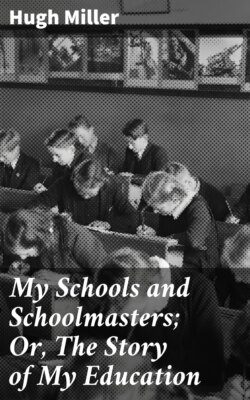Читать книгу My Schools and Schoolmasters; Or, The Story of My Education - Hugh Miller - Страница 4
На сайте Литреса книга снята с продажи.
TO THE READER.
ОглавлениеTable of Contents
It is now nearly a hundred years since Goldsmith remarked, in his little educational treatise, that "few subjects have been more frequently written upon than the education of youth." And during the century which has well-nigh elapsed since he said so, there have been so many more additional works given to the world on this fertile topic, that their number has been at least doubled. Almost all the men who ever taught a few pupils, with a great many more who never taught any, deem themselves qualified to say something original on education; and perhaps few books of the kind have yet appeared, however mediocre their general tone, in which something worthy of being attended to has not actually been said. And yet, though I have read not a few volumes on the subject, and have dipped into a great many more, I never yet found in them the sort of direction or encouragement which, in working out my own education, I most needed. They insisted much on the various modes of teaching others, but said nothing—or, what amounted to the same thing, nothing to the purpose—on the best mode of teaching one's-self. And as my circumstances and position, at the time when I had most occasion to consult them, were those of by much the largest class of the people of this and every other civilized country—for I was one of the many millions who need to learn, and yet have no one to teach them—I could not help deeming the omission a serious one. I have since come to think, however, that a formal treatise on self-culture might fail to supply the want. Curiosity must be awakened ere it can be satisfied; nay, once awakened, it never fails in the end fully to satisfy itself; and it has occurred to me, that by simply laying before the working men of the country the "Story of my Education," I may succeed in first exciting their curiosity, and next, occasionally at least, in gratifying it also. They will find that by far the best schools I ever attended are schools open to them all—that the best teachers I ever had are (though severe in their discipline) always easy of access—and that the special form at which I was, if I may say so, most successful as a pupil, was a form to which I was drawn by a strong inclination, but at which I had less assistance from my brother men, or even from books, than at any of the others. There are few of the natural sciences which do not lie quite as open to the working men of Britain and America as Geology did to me.
My work, then, if I have not wholly failed in it, may be regarded as a sort of educational treatise, thrown into the narrative form, and addressed more especially to working men. They will find that a considerable portion of the scenes and incidents which it records read their lesson, whether of encouragement or warning, or throw their occasional lights on peculiarities of character or curious natural phenomena, to which their attention might be not unprofitably directed. Should it be found to possess an interest to any other class, it will be an interest chiefly derivable from the glimpses which it furnishes of the inner life of the Scottish people, and its bearing on what has been somewhat clumsily termed "the condition-of-the-country question." My sketches will, I trust, be recognised as true to fact and nature. And as I have never perused the autobiography of a working man of the more observant type, without being indebted to it for new facts and ideas respecting the circumstances and character of some portion of the people with which I had been less perfectly acquainted before, I can hope that, regarded simply as the memoir of a protracted journey through districts of society not yet very sedulously explored, and scenes which few readers have had an opportunity of observing for themselves, my story may be found to possess some of the interest which attaches to the narratives of travellers who see what is not often seen, and know, in consequence, what is not generally known. In a work cast into the autobiographic form, the writer has always much to apologize for. With himself for his subject, he usually tells not only more than he ought, but also, in not a few instances, more than he intends. For, as has been well remarked, whatever may be the character which a writer of his own Memoirs is desirous of assuming, he rarely fails to betray the real one. He has almost always his unintentional revelations, that exhibit peculiarities of which he is not conscious, and weaknesses which he has failed to recognise as such; and it will no doubt be seen that what is so generally done in works similar to mine, I have not escaped doing. But I cast myself full on the good-nature of the reader. My aims have, I trust, been honest ones; and should I in any degree succeed in rousing the humbler classes to the important work of self-culture and self-government, and in convincing the higher that there are instances in which working men have at least as legitimate a claim to their respect as to their pity, I shall not deem the ordinary penalties of the autobiographer a price too high for the accomplishment of ends so important.
